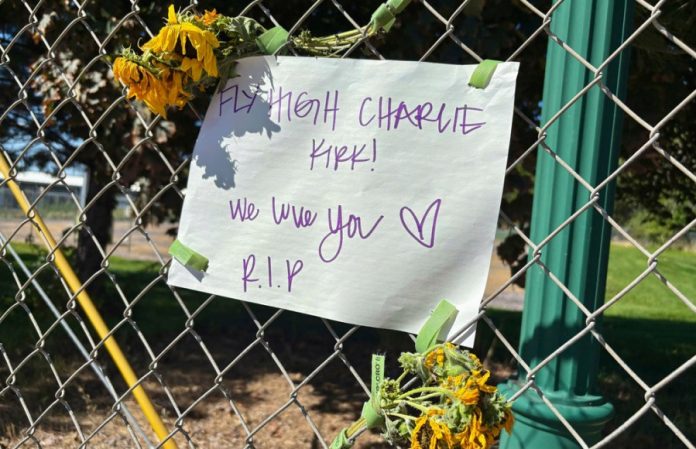
Charlie Kirk spent his career showing up where he wasn’t welcome. Mostly on college campuses, where he would set up a tent and invite students to argue with him. At 31, the Turning Point USA founder and father of two was fatally shot Wednesday afternoon while doing what he had built his career around for more than a decade: encouraging dialogue over violence and shouting matches.
Kirk believed deeply that “when people stop talking, really bad stuff starts. When marriages stop talking, divorce happens. When civilizations stop talking, civil war ensues. What we as a culture have to get back to is being able to have reasonable disagreement where violence is not an option.”
The only rational response to such an act of terror is sympathy. Keep the political statements in your pocket. But the response to Kirk’s death has been depressingly predictable. Within hours, partisan actors on both sides weaponized the tragedy for political gain. Some Republicans immediately declared war on liberal extremism, despite no known suspect or motive for the shooting. Some Democrats focused more on relitigating Kirk’s rhetoric than mourning his death.
This is our test as a civil society: Can we protect those we despise and refuse to use our losses to score political points? We are failing spectacularly.
I always thought Kirk argued with cherry-picked facts that supported his agenda. His debate style involved talking fast and self-righteously to overwhelm intimidated college students. But personal disagreement becomes irrelevant when someone dies for their political beliefs. The important thing to recognize — and this requires looking above the mess of social media and ordinary life — is that many Americans no longer accept that, in a free society, nobody should die for their political beliefs, no matter how wrong those beliefs might be.
Conservative pundits filled X with declarations of “war.” Douglas Murray claimed on Sky News just after the assassination that “most conservatives tend to think the left is wrong, but in its entirety, not evil; but that favor is not returned.”
Yet this narrative conveniently overlooks Republicans’ own complicated relationship with political violence. Jan. 6 stands as stark evidence, as does the hammer attack on Paul Pelosi by a mentally ill man echoing far-right conspiracy theories (whose motives Elon Musk recklessly mischaracterized). And recall the assassination of a Minnesota Democratic state representative and her husband by an alleged Trump supporter just three months ago.
Far worse is the left. On MSNBC, now-fired analyst Matthew Dowd declared that those like Kirk who share “hateful” rhetoric should “expect awful actions to take place.” If hateful thoughts lead to hateful actions, as Dowd suggests, then what of the hateful words Dowd himself spoke about a man whose body was still warm? Would he accept the same logic if his own family were attacked?
On X, a post reading “Breaking: Charlie Kirk loses gun debate” went viral with 424,000 likes; the hashtag #charliesquirt is trending on the platform. Former Sen. Al Franken (D-Min.) condemned political violence, but only after clarifying that he “never thought [he’d] say a prayer for Charlie Kirk.” Such smears are vile and contemptible.
What does it say about us that assassination is first and foremost an opportunity for political point-scoring? We have lost the ability to recognize that some basic human boundaries must never be crossed. This is the logical endpoint of political discourse that no longer believes good-faith disagreement.
The onus falls especially on those of us who vehemently disagreed with Charlie Kirk to resist the inflammatory rhetoric and demand better. When someone tries to drag you into the gutter, ask them what vision they have for America. Do they still believe in democratic principles? Do they respect the rule of law? Do they value human life universally, not selectively? Many on the right will use this tragedy to silence dissent, arguing that criticism killed Charlie Kirk. That’s wrong too. We should never be afraid to express our views — that’s a fundamental right in a free society. But it’s equally fundamental to participate in that society without fear of violence.
This is the consequence of years of people peddling the line that “words are violence.” That’s typically nonsense designed to quell free speech and incite retaliatory violence. Words are words; shooting someone in the throat is violence. But words do have consequences. Those who have systematically dehumanized political opponents should examine what they have created.
Charlie Kirk believed in the possibility of reasonable disagreement. America needs more who, as Ezra Klein described today, “Practice Politics the Right Way”: willing to talk across divides, to find common ground, to remember that our political opponents are still human beings with families and dreams and fears. Just one day before his death, Kirk posted a photograph of Iryna Zarutska, the young woman murdered on a Charlotte light rail, and wrote beneath it: America will never be the same. America will not be the same. His own murder proved it. But his life’s work will inevitably shape what comes next. He fought the good fight, he kept the faith, and he finished his race.
Kirk once wrote, “You can tell a lot about a person by how they react when someone dies.” He was right. My thoughts are with Charlie’s young wife and the two children he leaves behind. With them, and with anyone in this country who still cares about preserving a sense of common humanity.
William Liang is a writer living in San Francisco.

